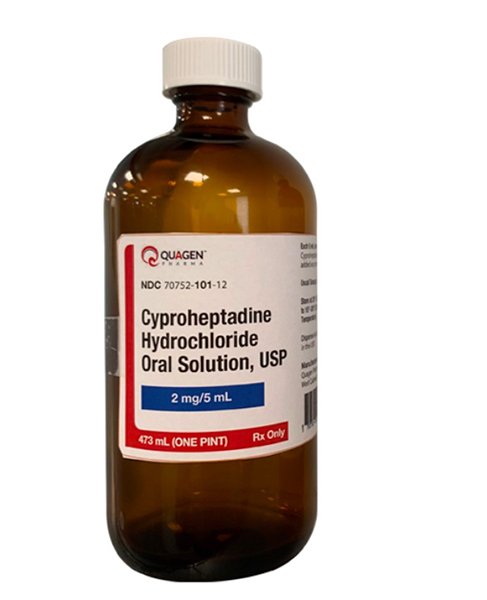Cyproheptadine Hydrochloride Oral Solution, USP

Cyproheptadine Hydrochloride Oral Solution, USP
Product Name: Cyproheptadine Hydrochloride Oral Solution, USP
NDC: 70752-101-12
Strength: 2 mg/5 mL
Size(s): 473 mL
DESCRIPTION
Each 5 mL (one teaspoonful) contains: Cyproheptadine Hydrochloride 2 mg
Inactive Ingredients: Citric acid, D&C Yellow #10, peppermint flavor, purified water, propylene glycol, sodium citrate, sorbic acid (0.1% as preservative) and sucrose syrup.
Cyproheptadine HCl is an antihistaminic and antiserotonergic agent. Cyproheptadine hydrochloride is a white to slightly yellowish, crystalline solid, with a molecular weight of 350.89, which is slightly soluble in water, freely soluble in methanol, sparingly soluble in ethanol, soluble in chloroform and practically insoluble in ether. It is the sesquihydrate of 4-(5H-dibenzo[a,d]cyclohepten-5-ylidene)-1-methylpiperidine hydrochloride.
INDICATIONS AND USAGE
- Perennial and seasonal allergic rhinitis
- Vasomotor rhinitis
- Allergic conjunctivitis due to inhalant allergens and foods
- Mild, uncomplicated allergic skin manifestations of urticaria and angioedema
- Amelioration of allergic reactions to blood or plasma
- Cold urticaria
- Dermatographism
- As therapy for anaphylactic reactions adjunctive to epinephrine and other standard measures after the acute manifestations have been controlled.
WARNINGS
- Children: Overdosage of antihistamines, particularly in infants and children, may produce hallucinations, central nervous system depression, convulsions and death.
- Antihistamines may diminish mental alertness; conversely, particularly in the young child, they may occasionally produce excitation.
- CNS Depressants: Antihistamines may have additive effects with alcohol and other CNS depressants, e.g., hypnotics, sedatives, tranquilizers, antianxiety agents.
- Activities Requiring Mental Alertness: Patients should be warned about engaging in activities requiring mental alertness and motor coordination, such as driving a car or operating machinery.
- Antihistamines are more likely to cause dizziness, sedation and hypotension in elderly patients.
PRECAUTIONS
General: Cyproheptadine has an atropine-like action and, therefore, should be used with caution in patients with:
- History of bronchial asthma
- Increased intraocular pressure
- Hyperthyroidism
- Cardiovascular disease
- Hypertension
Information for Patients: Antihistamines may diminish mental alertness; conversely, particularly in the young child, they may occasionally produce excitation. Patients should be warned about engaging in activities requiring mental alertness and motor coordination, such as driving a car or operating machinery.
Drug Interactions: MAO inhibitors prolong and intensify the anticholinergic effects of antihistamines. Antihistamines may have additive effects with alcohol and other CNS depressants, e.g., hypnotics, sedatives, tranquilizers, antianxiety agents.
Carcinogenesis, Mutagenesis, Impairment of Fertility: Long-term carcinogenic studies have not been done with cyproheptadine. Cyproheptadine had no effect on fertility in a two-litter study in rats or a two-generation study in mice at about 10 times the human dose. Cyproheptadine did not produce chromosome damage in human lymphocytes or fibroblasts in vitro; high doses (10-4M) were cytotoxic. Cyproheptadine did not have any mutagenic effect in the Ames microbial mutagen test; concentrations of above 500 mcg/plate inhibited bacterial growth.
Pregnancy: Pregnancy Category B. Reproduction studies have been performed in rabbits, mice and rats at oral or subcutaneous doses up to 32 times the maximum recommended human oral dose and have revealed no evidence of impaired fertility or harm to the fetus due to cyproheptadine. Cyproheptadine has been shown to be fetotoxic in rats when given by intraperitoneal injection in doses four times the maximum recommended human oral dose. Two studies in pregnant women, however, have not shown that cyproheptadine increases the risk of abnormalities when administered during the first, second and third trimesters of pregnancy. No teratogenic effects were observed in any of the newborns. Nevertheless, because the studies in humans cannot rule out the possibility of harm, cyproheptadine should be used during pregnancy only if clearly needed.
Nursing Mothers: It is not known whether this drug is excreted in human milk. Because many drugs are excreted in human milk, and because of the potential for serious adverse reactions in nursing infants from cyproheptadine, a decision should be made whether to discontinue nursing or to discontinue the drug, taking into account the importance of the drug to the mother.
Pediatric Use: Safety and effectiveness in pediatric patients below the age of two years have not been established.